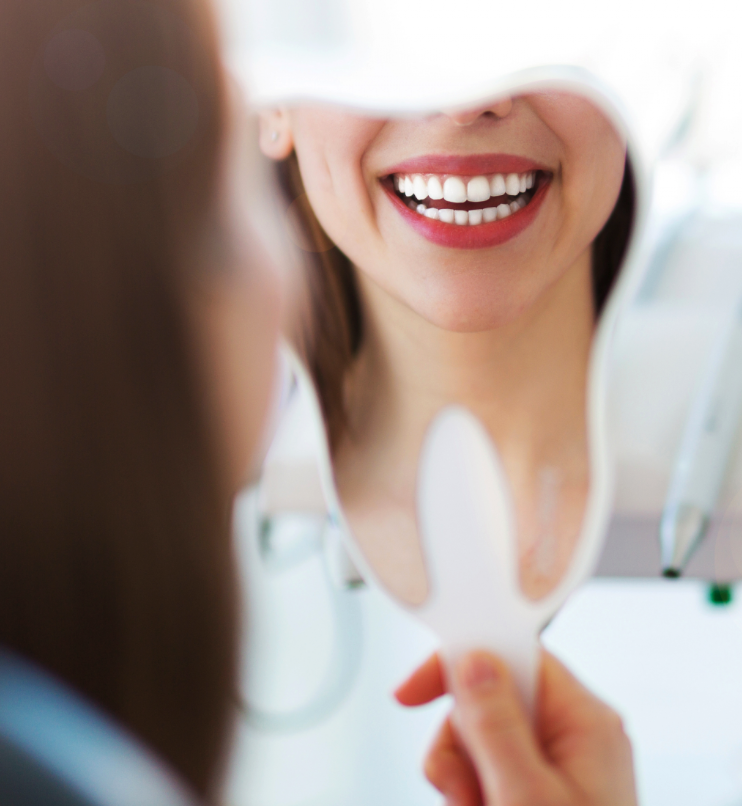
- Jaw Alignment Issues
- Improper Bite
- Loss of Bone Density
- Teeth Shifting
- Gaps/Spacing
- Joint and Muscle Pain
- Stress on Remaining Teeth
- Additional Tooth Loss
The good news is, we can help! At Natural Dentist Associates, our dental surgeons have been placing and restoring dental implants since 2002 in our Rockville, MD office location. With state-of-the-art technology, well trained staff, and experienced Holistic Implant Dentists, we are well-equipped to help you through all stages of the dental implant process.
What are Dental Implants?
For many years, dental bridges or removable dentures were the only tooth replacement options available. Today, we have a third, more permanent option: Dental Implants. Dental Implants are replacement tooth roots. These replacement tooth roots are embedded in your jawbone, becoming a fixed part of your mouth. Once the implant has fused to the jawbone, your dentist will fabricate an implant crown that matches the rest of your natural teeth, giving you a beautifully restored smile. With a success rate of up to 98%, dental implants are the best way to replace one or more missing teeth because they look, feel, and function like your natural teeth. And with proper care, dental implants can last a lifetime. The first step on your tooth replacement journey is a consultation with an experienced Implant Dentist.
Dental Implant Consultation
Before beginning oral surgery, it is best to schedule a formal consultation to make sure you are a candidate for Dental Implants. Every patient is different, and a consultation will provide you with a personalized treatment plan, tailored to fit your individual needs. Here is what to expect during your Implant Consult with Natural Dentist Associates:
X-ray Examination- An X-ray or CT Scan is required prior to implant placement. This x-ray will help the oral surgeon determine how dense the bone is, and whether there is enough bone structure to support a dental implant. This x-ray will also guide the implant dentist in determining where exactly the implant should be placed to provide best results, and to avoid damaging vital structures such as nerves.
Oral Examination- During your consultation, the dentist will review your medical and dental history. She will thoroughly examine your teeth, gums, and assess your overall health. Your x-ray will be read and diagnosed, all helping to determine your treatment options.
Discuss Treatment Options- After a full examination, your Implant Dentist will explain the clinical findings, and discuss the treatment and sedation options available to you. This is the time when you will be able to ask any questions you may have. It is a great idea to write down your questions about dental implants and bring them with you to your consultation appointment so you do not forget in the moment.
Receive Your Formal Treatment Plan- Once the treatment plan has been determined and discussed, a treatment plan coordinator will present a formal treatment plan. This plan will include costs, appointment lengths, as well as any pre-operative or post-operative instructions.

Tooth Extraction
Perhaps you are not missing a tooth, but your dentist has recommended having a tooth removed for any number of reasons. In this case, your first step will be having the tooth extracted. Fortunately, the Oral Surgeons at Natural Dentist Associates can help with this step as well. Tooth extractions can be done using local anesthesia (numbing injection), nitrous oxide (laughing gas), oral sedation, or full IV sedation, all depending on your needs.
Platelet Rich Fibrin (PRF)
We recommend placement of PRF (platelet rich fibrin) following all tooth removal procedures. When applied following oral surgery, PRF can accelerate healing, decrease the risk of infection, and improve the comfort and safety of treatment. PRF is acquired by obtaining a small amount of the patient’s blood and spinning it in a centrifuge for 13 minutes at 2,700 RPMs. The spinning process separates the blood into three layers, including the yellow layer of interest. The PRF is a mixture of Fibrin, White Blood Cells and Bone Growth Factors, including morphogenic protein. Because PRF is made from your blood, it is completely natural. PRF appears as a yellow jello-like substance that is placed into the extraction site following oral surgery.
Ozone Therapy
Due to it’s healing properties, we also incorporate the use of Ozone Therapy into all oral surgery procedures at Natural Dentist Associates. Ozone is a molecule consisting of three atoms of oxygen. It is produced naturally by lightning and by various industrial processes. Ozone can be used in dentistry with no side effect and no contraindications with other medicine or medical disorders a patient may have. When ozone molecules split into single oxygen atoms, they can react when coming into contact with a contaminant. This reaction is all done through the single atom oxidizing the contaminants. As the reaction takes place, it destroys all the contaminants it comes into contact with by changing it’s physical properties, resulting in the contaminant no longer being toxic or able to reproduce. Ozone application effectively helps to reduce postoperative pain following oral surgery.
Natural Bone Graft
Though Natural Bone Grafting is recommended with all extraction and dental implant surgeries, for patients suffering from bone-loss, Bone Grafting is required. While conventional bone grafts are done by purchasing a bone graft product and placing it into a surgical site, natural bone grafting uses the patient’s Bone Growth Factors and Blood Products in addition to Bone Grafting Material. Natural Bone Grafting helps surgical sites to heal quicker with less swelling and greater success.
Dental Implant Placement
Once you have finalized your treatment plan and completed any necessary tooth extractions and/or bone grafting, you are ready to begin the Dental Implant Process! Implant Placement refers to the surgical procedure of embedding the implant into your jawbone. Depending on individual circumstances, in some cases the implant can be placed on the same day as tooth extraction and/or bone grafting. If your missing tooth is in the front, we can make you something temporary to wear home and hide the gap in your smile.
Tooth Implant Options
Whether you are missing one, several, or all of your teeth, there is an implant option for you. At Natural Dentist Associates, we have several implant options, including material options that cater to sensitive systems. Your doctor will work with you to find the right treatment option to fit your needs and your budget.
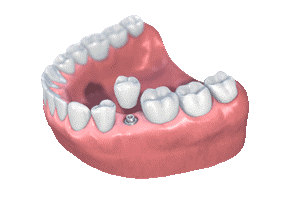
Single Tooth Implant (Titanium)
If you are missing one tooth, the best treatment option may be a single tooth titanium dental implant. Single tooth implants are free-standing and do not connect to other teeth. This means you can brush and floss a single dental implant in the same way as your natural teeth. The titanium implant is the strongest and most durable option for single tooth replacement. Introduced in the 1960s, titanium implants have a very long track record of success. Titanium implants tend to heal quicker than other material options and are more forgiving in a “heavy” bite.
Single Tooth Implant (Zirconia)
Like the titanium implant, the zirconia single tooth implant is another great replacement option for a patient who is missing one tooth. Zirconia implants have been around since 1987, becoming increasingly popular in recent years as dental patients become more conscious about the dental materials being used in their mouth. Zirconia is a ceramic material that is white in color, providing a very natural esthetic. Zirconia implants are a metal-free alternative to traditional titanium implants, making Zirconia the ideal option for any patient with a titanium or metal allergy. If you are unsure about any dental material allergies you may have, we offer Dental Materials Testingto help determine what implant material is ideal for you.
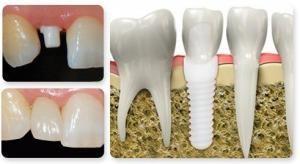
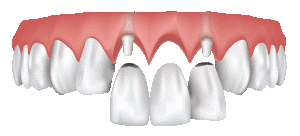
Implant Supported Bridge
If you are missing a span of 2-6 teeth, a dental implant bridge is a great replacement option. Dental implant bridges can be made with titanium or zirconia implants. Though the dental implants for bridges are placed in the same manner as individual tooth implants, the crowns on implant bridges are connected to one another. This means you will be unable to floss between bridged teeth. Fortunately, implant bridges do not risk decay, which is a huge advantage over natural tooth bridges, which can be very difficult to clean around/under. While traditional dental bridges require a healthy tooth on each side of the missing teeth to be grinded down/reshaped to use as support for the bridge, a dental implant bridge is supported by 2 or more dental implants that have been embedded into your jaw, preserving the surrounding healthy teeth. A 2-tooth bridge is called a cantilever bridge. In this case, one implant may be placed to support two missing teeth
All-On-4 Full Mouth Dental Implant Bridge
For patients who are missing all upper or lower teeth, a full arch implant bridge could be the ideal replacement option. All-On-4 dental implants is a method to replace a full arch of 12-14 teeth, supported by 4-6 dental implants. Though it is called “All-on-4” sometimes it is ideal to place 5 or 6 implants for stability purposes. Full arch dental implant bridges can be made using titanium or zirconia dental implants.
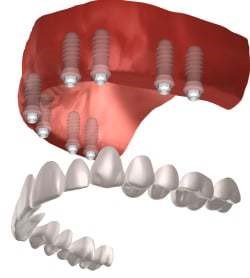
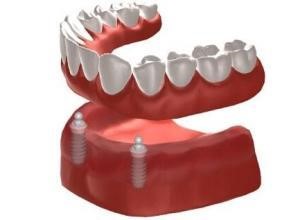
Implant Dentures
Also referred to as Implant Supported Removable Denture or Over-Denture, Implant Dentures are a very practical and cost-effective solution to replace all teeth. Dentures attached to implants are essentially removable bridges. Overdentures look like teeth, function well, and are quite stable in chewing and other normal functions. An entire mouth of teeth can be replaced by placing 6-8 dental implants and inserting special abutments into the denture as well as the implants. These connectors allow the overdenture to be easily snapped in or out for easy cleaning, while remaining far more stable than traditional removable dentures.
Integration Period:
Now that your dental implant(s) have been placed, there is a waiting period. Though sometimes the extraction, bone grafting and/or implant placement can all be done during one appointment, to become a stable “tooth root,” an implant is going to need some time to heal and become structurally and functionally connected to the jawbone. This healing period is called Osseointegration, lasting anywhere from six weeks to six months, depending on the location of the implants, the health of the jawbone, and patient compliance. In cases where the missing tooth/teeth are in the front of your mouth, we can fabricate something temporary to cover the gap in your smile during this waiting period.
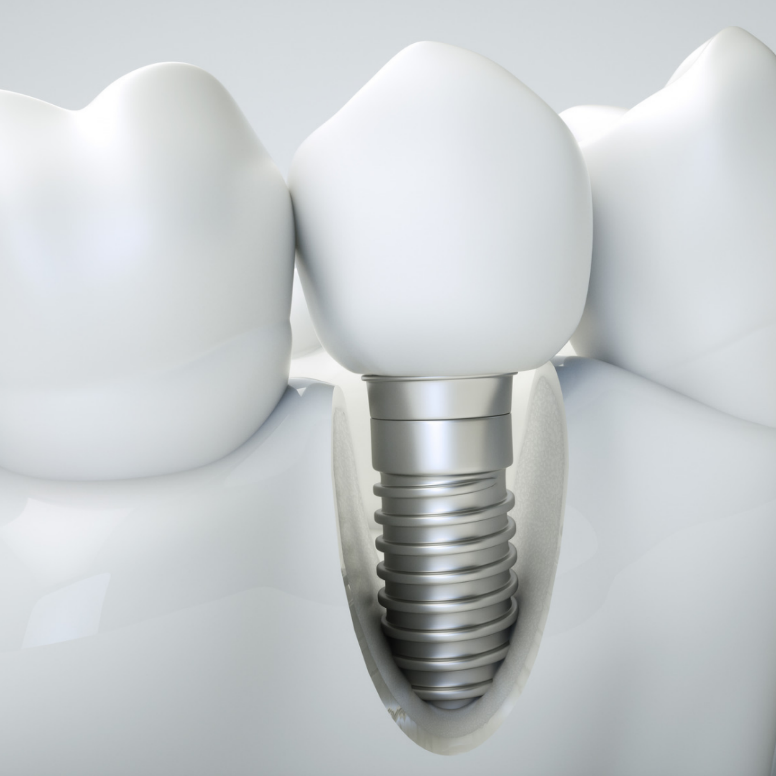
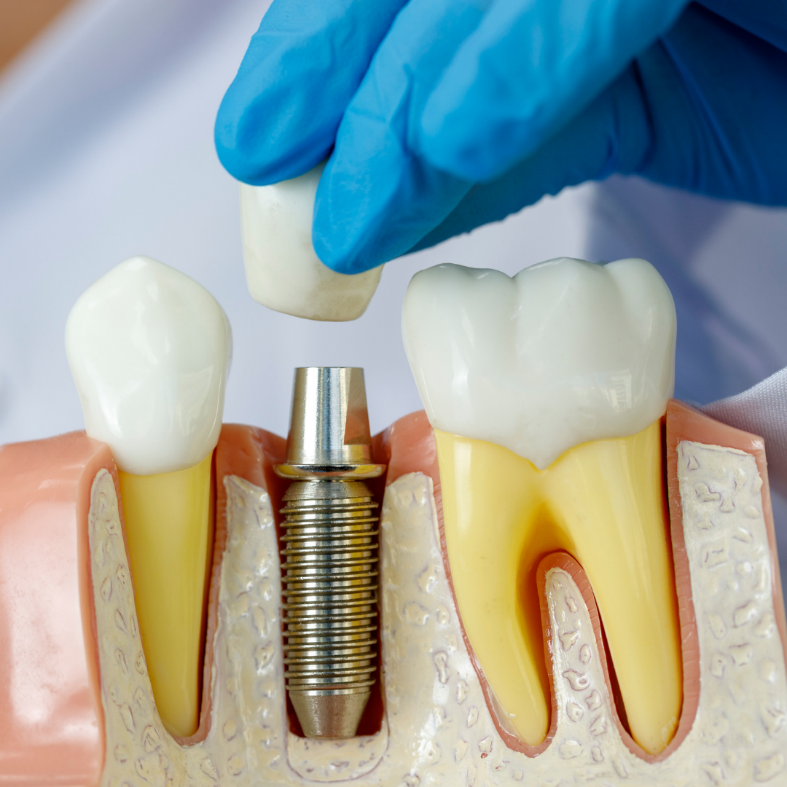
Implant Abutment
Once osseointegration is complete and you have a sturdy tooth root, you are ready for a new tooth. But first, an abutment must be attached to the implant. An abutment is the connecting structure that attaches the crown (tooth) to the implant (tooth root). Abutments can be made of several different materials. Your dentist will consider all options, and help you choose the right abutment for your new tooth.
Dental Implant Crown:
Once the abutment has been selected, we will take an impression of your current teeth or jaw. This model will be used to fabricate crowns, bridges, or dentures that are a proper size and shape for your mouth. This selection is extremely important for maintaining your bite. Most importantly, we will take special care in choosing the correct shade and color for your replacement teeth, ensuring that the shade remains consistent across all teeth, giving you full confidence in your new smile. The molds taken at this appointment, along with the color and shade selections, will be sent to a highly skilled dental lab who will create your new teeth. Once the new crowns are completed, they will be shipped back to our office. At your next, and final appointment, the doctor will attach the new teeth, making sure everything looks, feels, and functions just right. The only thing left to do now is step out and flash your new smile!
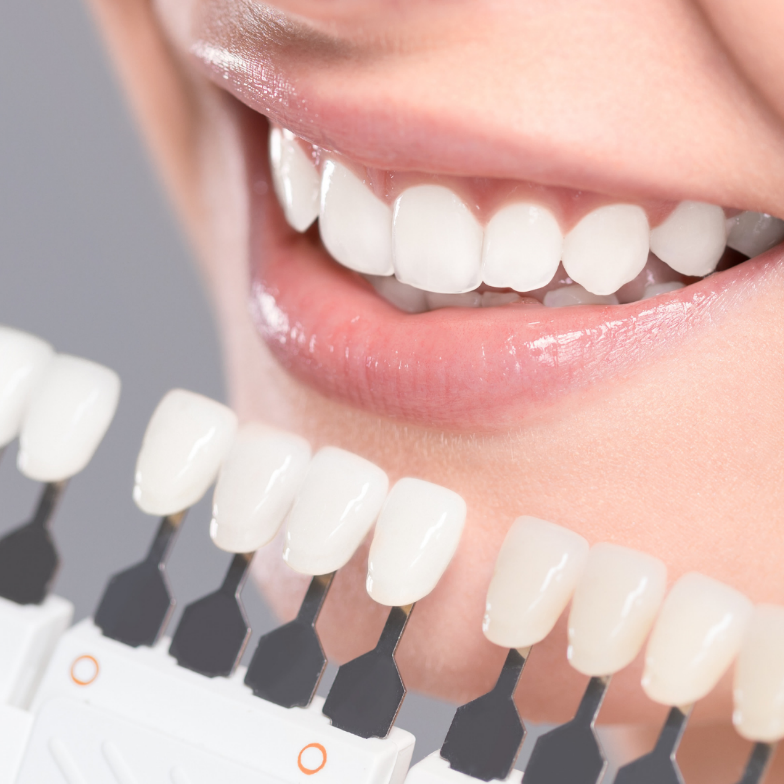

Do I Still Need to Have My Teeth Cleaned with Dental Implants?
Yes. Daily implant care should be similar to that of natural teeth, with brushing, flossing, and regular dental check-ups. Though there is no remaining tooth root or structure, there is still jawbone and healthy gums to maintain. When there is not proper implant care, the gum surrounding your implant will begin to pull away from the implant. Unless treated, this gum-loss can progress to bone-loss, which can lead to removal of your dental implant. The best way to avoid bone-loss and protect your dental implants and oral health is by practicing proper home care.
Are Dental Implants Safe?
Yes. Dental implants have been used to replace teeth for over 50 years. As with any surgical procedure, there are possible complications, which is why it is important to select a well-trained dentist for your dental implant needs. Negative effects are rare and typically minor if they do occur. A knowledgeable surgeon will be well-equipped to handle any problem that might arise during your treatment.
How Long Does It Take to Replace Teeth with Implants?
There are many factors that will determine how long it takes to replace your teeth, such as your medical and dental history, bone health and density, materials used, technique, and whether you need a tooth extracted, and your body’s ability to heal itself. The implant process can take anywhere from a few months, up to over a year for more complex cases.
What is the Success Rate of Dental Implants?
For a healthy individual with good oral hygiene, dental implants have a success rate between 90-95%.
Does Dental Insurance Cover Dental Implants?
It all depends on the individual plan coverage. Some insurance plans offer benefits for dental implants anywhere between 30-80%. Other insurance plans do not cover implants if the tooth was missing prior to coverage, or at all. We will take your insurance information at the time of scheduling and check your implant benefits prior to your implant consultation.
How Much Do Dental Implants Cost?
Typically, dental implants cost around the same as replacing a tooth with a fixed bridge. The cost varies by individual patient needs, bone density, materials, quality of the dental lab, and what city/state you are having the treatment done. Though many offices will provide a quote by phone, the best way to determine the cost for your specific needs is by scheduling an implant consultation.
Are Dental Implants Permanent?
Yes. With proper care, dental implants will last a lifetime.
Do Implants Stay in the Mouth? Can Dental Implants Fall Out?
Implants are permanent fixtures and should not fall out during any normal activity. The exception is implant dentures which are designed to be taken out and put in by the patient.
What Kind of Dentist Does Implants?
Dental Implants can be done by any dentist or specialist who has had proper implant training. It is important to keep in mind that some dentists or specialists are only trained to place the initial implant and would require you to return to another dentist for the full restoration. At Natural Dentist Associates, our doctors are fully trained and equipped to complete all parts of dental implant surgery, from the implant placement to placing the final crown, bridge, or denture.
Who Can Get Dental Implants?
Any healthy person who is missing teeth but has sufficient bone density and is not allergic to implant materials can get dental implants. During your initial consultation, your implant dentist will determine whether you are a candidate for dental implants.
What is the Recovery Period for Dental Implants?
The dental implant recovery period is surprisingly short and painless. You can expect to return to work and other daily routines the next day following your procedure. Your doctor will prescribe any pain relievers and/or antibiotics necessary for recovery.
Does Dental Implant Surgery Hurt?
With local anesthesia (numbing injection) the nerve and surrounding area will be numb during your procedure. The numbing should prevent any pain, but you can expect to feel some pressure during the procedure. If you have dental anxiety, have difficulty getting numb, or just don’t want to remember the procedure, we offer several options for dental sedation.
What are the Benefits of Dental Implants?
- Aesthetics- Dental implants are a permanent replacement for missing teeth, completing your smile in a natural and structurally sound way.
- Speech- Missing teeth and poor fitting dentures can cause speech issues such as lisp, slurring, and mumbling. Because dental implants are permanent fixtures, replacing teeth with implants allow you to speak without lisping through the open space, or worrying about your denture slipping out while you talk.
- Eating- The more teeth you are missing, the more difficult it becomes to eat. Dental implants enable you to chew all your favorite foods without a denture slipping.
- Self-esteem- Many people with missing teeth lack self-confidence in their smile and may even avoid smiling because of it. Dental implants can give you the smile you’ve always dreamed of, allowing you to smile and laugh without feeling self-conscious about your teeth.
- Durability- Dental implants are the next best thing to having your natural teeth. With proper care, implants can last a lifetime.
- Comfort- Dental implants fuse to your jawbone, allowing you to brush and floss normally, and eliminating the discomfort of removable dentures.
- Healthy digestive function- Missing teeth results in people swallowing larger pieces of food, putting unnecessary strain on your digestive system. Unchewed food can get stuck in the stomach, causing digestive issues. Replacing missing teeth restores normal chewing function.
- Preserving mouth and facial structure- Missing teeth causes bone-loss and changes in facial structure. Over time the face begins to shrink and sink where teeth are missing. Dental implants stimulate bone and prevent bone-loss.
- Improved oral health- Dental implants do not risk decay and allow you to floss in between just like natural teeth. Additionally, no healthy teeth are reduced to support a dental implant, like with a traditional bridge. This helps to maintain your oral health and hygiene.
Elevate your health and smile with dental implants from Natural Dentist Associates. At our practice, we are dedicated to providing personalized, holistic dental services & materials that cater to your unique needs. Our expert team utilizes cutting-edge technology and advanced techniques to ensure the highest quality of care, helping you achieve a stunning, natural smile that you can be proud of.
We invite you to join our growing family of satisfied patients who have discovered the difference that exceptional dental care can make. Whether you’re seeking to repair a damaged tooth or enhance your overall appearance, we’re here to guide you through every step of the process and ensure your comfort and satisfaction.
Proudly serving Rockville, Bethesda, Silver Spring, Wheaton, Potomac, DC, Gaithersburg, Kensington, Germantown, Burtonsville, Laurel, Columbia, and Northern Virginia (Mclean, Tysons Corner, Great Falls, Arlington), we’re honored to be your trusted partner in your journey to a healthier, more beautiful smile. We also welcome patients from all over the country who choose us for our specialized and holistic dental services.
